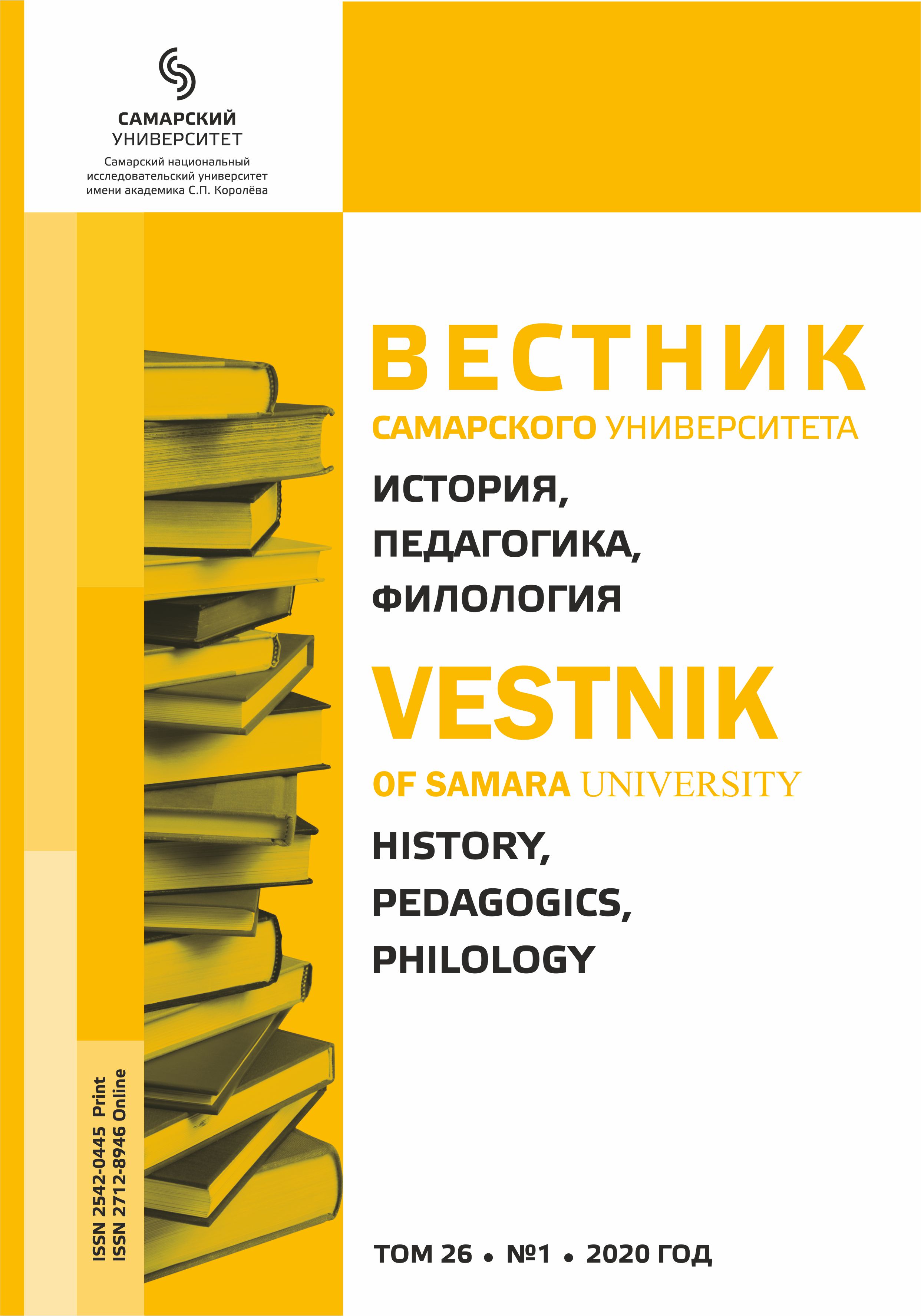Grammar component in the structure of students’ language education
- Authors: Khramtcova A.B.1
-
Affiliations:
- Samara National Research University,
- Issue: Vol 26, No 1 (2020)
- Pages: 101-105
- Section: Articles
- URL: https://journals.ssau.ru/hpp/article/view/7735
- DOI: https://doi.org/10.18287/2542-0445-2020-26-1-101-105
- ID: 7735
Cite item
Full Text
Abstract
In the article the author views the peculiarities of formation of sociocultural literacy that seems to be knowledge of national and cultural characteristics of the country of the studied language, the culture of speech behavior. Its structure contains value, cognitive, activity and subjective-personal aspects. Studies have proven that the presence of social literacy contributes to the actual self-realization of a person. However, until today in the scientific community there is no exact definition of the concept of "literacy". Today, the quality of literacy has changed in connection with the development of society and the needs of the individual; it should contribute to its inclusion in the cultural life of the country for its progress and its self-development. Sociocultural literacy is a matter of the general education of a person who is not only able to solve normative problems in a quality manner, but also those that are dictated by global social processes, integration into the world community. In the article the author defines literacy as preparedness for development, and competence – as a level of culture. Thus, she proves the necessity of relying on cultural and competency-based approaches to the formation of students' sociocultural competence, which will be facilitated by the synthesis of the activity and personality components of readiness for a certain behavior during communication with representatives of other cultures.
About the authors
A. B. Khramtcova
Samara National Research University,
Author for correspondence.
Email: morenov@ssau.ru
ORCID iD: 0000-0002-5777-4950
Candidate of Pedagogical Sciences, associate professor, Department of Foreign Languages and Professional Communication
References
- Rodgers 2000 – Rodgers T.S. (2000) Methodology in the New Millennium. English Teaching Forum, 2000, vol. 38/2, рр. 2–13.
- Georgievskaya 2011 – Georgievskaya T.M. (2011) Correction of errors in writing training. Foreign Languages in Tertiary Education, no. 4, pp. 112–117. (In Russ.) Available at: http://www.elibrary.ru/item.asp?id=16505015.
- Gonzales, Kibisova 2017 – Gonzales O.E., Kibisova K.B. (2017) Grammatical Errors while Learning a Foreign Language (Spanish): The Reasons and Ways of Their Elimination]. Tyumen State University Herald. Humanities Research. Humanitates, vol. 3, no. 4, pp. 243–267. (In Russ.) DOI: http://doi.org/10.21684/2411-197X-2017-3-4-243-267.
- Ivantcova 2010 – Ivantcova E.V. (2010) About the Term «Language Identity»: Origins, Problems, Application. Proceedings of Tomsk State University. Philology, 2010, no. 4 (12), pp. 24–32. (In Russ.) Available at: file:///C:/Users/inostr2/Downloads/o-termine-yaz-kovaya-lichnost-istoki-problem-perspektiv-ispolzovaniya.pdf.
- Kolomiychenko, Gruzdeva 2015 – Kolomiychenko L.V. and Gruzdeva I.B. (2015) Sociocultural competence: its culturological aspects, essence, approaches to the definition. Modern problems of science and education, no. 1–1. (In Russ.) Available at: http://science-education.ru/ru/article/view?id=19433.
- Kyshtymova 2014 – Kyshtymova T.V. (2014) Concept «Language Personality» of Modern Linguistics. Proceedings of Chuvash State Pedagogical University, 2014, no. 6, pp. 237–242. (In Russ.) Available at: file:///C:/Users/inostr2/Downloads/ponyatie-yaz-kovaya-lichnost-v-sovremennoy-lingvistike.pdf.
- Lewis 1999 – Lewis R.D. (1999) When Cultures Collide. Managing sucessfully across cultures. Moscow: Delo, 439 p. (In Russ.) Available at: http://freedocs.xyz/pdf-452868055.
- Martynyuk 2010 – Martynyuk T.P. (2010) Concept of functional sociocultural literacy in foreign language education, in: V International Research and Practical Conference «Mikhail-Archangel Readings»: сollection of materials (November 18 2010). Rybnitsa, pp. 212–215. (In Russ.) Available at: http://textarchive.ru/c-2935685-p47.html.
- Passov, Kibireva, Kollarova 2007 – Passov E.I., Kibireva L.V., Kollarova E. (2007) Concept of Communicative Foreign Language Education. Saint Petersburg: Zlatoyst, 2007, 199 p. (In Russ.) Available at: http://rucont.ru/efd/343305.
- Trofimova 2012 – Trofimova E.B. (2012) Language Identity as an Object of Dingvistic research, in: Russian Language Identity in Modern Communicative Environment: materials of International Scientific Conference (22–23 November, 2012). Edited by E.V. Belogorodtceva. Biisk: АGАО, 2012, pp. 27–31. (In Russ.) Available at: http://www2.bigpi.biysk.ru/ff/doc/ff_RYAL.pdf.
- Khramtcova 2014 – Khramtcova A.B. (2014) English-language educational text in the imitation technologies structure, in: Professional Education: Problems, Approaches, Novations: collection of Scientific Articles. Edited by T.I. Rudneva. Samara, 2014, pp. 115–120. (In Russ.)
- Khramtcova 2014 – Khramtcova A.B. (2014) Professional Expression in Cultural Dialogue, in: Education in the Modern World: The Role of Universities in the Socio-economic Development of the Region: collection of Scientific Papers of the International Scientific and Methodological Conference. Edited by T.I. Rudneva, 2014, pp. 428–430. (In Russ.)
- Shevnin 2004 – Shevnin A.B. (2004) Erratology and interlingual communication. Proceedings of Voronezh State University. Series: Linguistics and intercultural communication, no. 2, pp. 36–44. (In Russ.) Available at: www.vestnik.vsu.ru/pdf/lingvo/2004/02/shevnin.pdf.
Supplementary files













